new to the gluten free journey?
new to the gluten free journey?
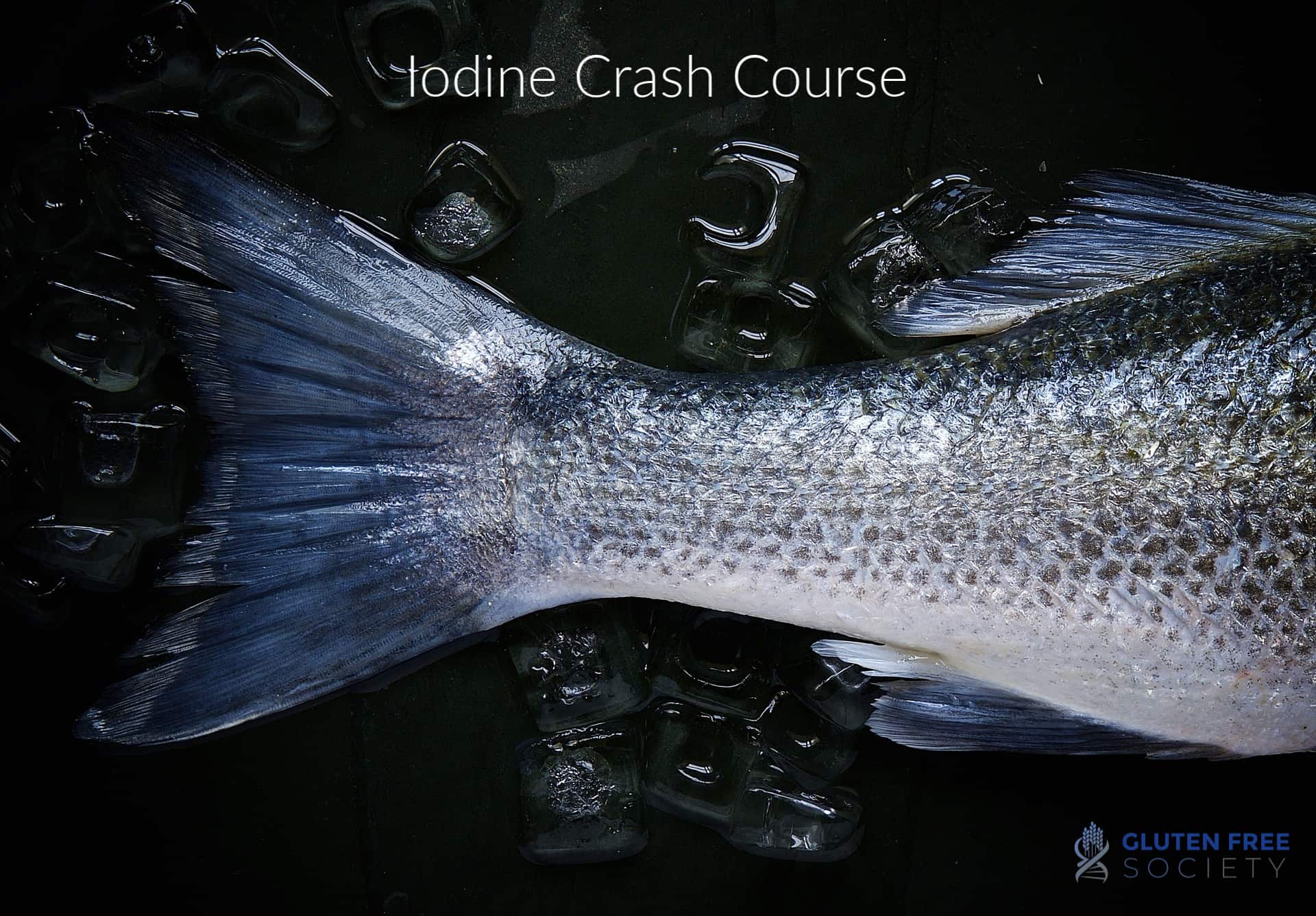
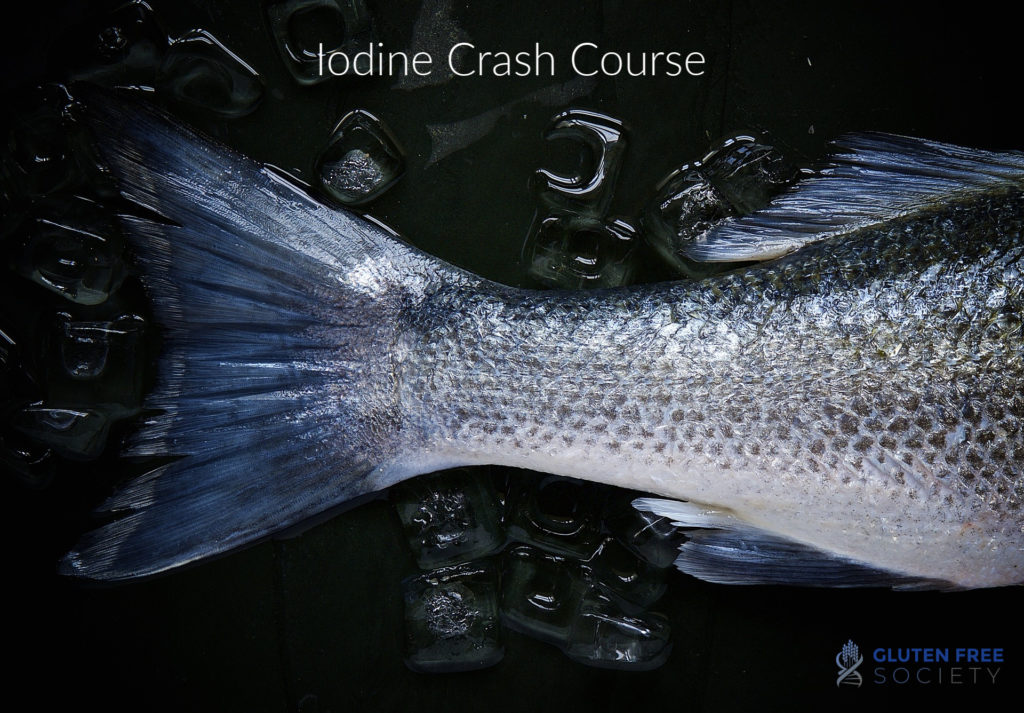 If you’ve ever looked closely at the table salt you purchase from the store, you will notice that most of the time, the labeling will say it has been iodized or fortified with iodine. That is because in the early 1900s scientists realized a need to fortify the diet with iodine to prevent the harmful symptoms of deficiency. While this is not as much of an issue in industrialized countries today, it’s important to know why this nutrient is essential and one the body cannot function without.
If you’ve ever looked closely at the table salt you purchase from the store, you will notice that most of the time, the labeling will say it has been iodized or fortified with iodine. That is because in the early 1900s scientists realized a need to fortify the diet with iodine to prevent the harmful symptoms of deficiency. While this is not as much of an issue in industrialized countries today, it’s important to know why this nutrient is essential and one the body cannot function without.
Contents
Toggle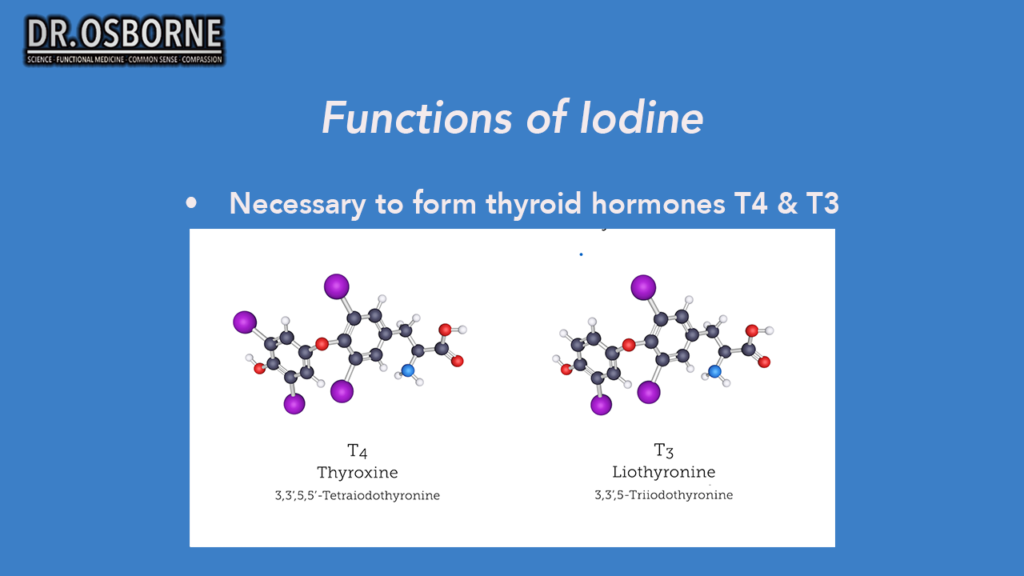 In short, this nutrient is necessary to produce T3 and T4 which are thyroid hormones. These not only regulate growth, but they are vital for metabolism, generating energy, and communicating with DNA about how cells are supposed to grow, heal, and repair. T3 is an active thyroid hormone with three molecules of iodine, while T4 is inactive and contains four molecules.
Once TSH (thyroid-stimulating hormone) is produced by the brain, it travels to the thyroid telling it to produce T4 and to trap more of this nutrient in the diet in order to produce T3. T3 then communicates to DNA to upregulate the metabolism. This process also requires Selenium, Tyrosine which is a protein, and Vitamins B2 and C. Without all of these, this process will not work correctly.
In short, this nutrient is necessary to produce T3 and T4 which are thyroid hormones. These not only regulate growth, but they are vital for metabolism, generating energy, and communicating with DNA about how cells are supposed to grow, heal, and repair. T3 is an active thyroid hormone with three molecules of iodine, while T4 is inactive and contains four molecules.
Once TSH (thyroid-stimulating hormone) is produced by the brain, it travels to the thyroid telling it to produce T4 and to trap more of this nutrient in the diet in order to produce T3. T3 then communicates to DNA to upregulate the metabolism. This process also requires Selenium, Tyrosine which is a protein, and Vitamins B2 and C. Without all of these, this process will not work correctly.
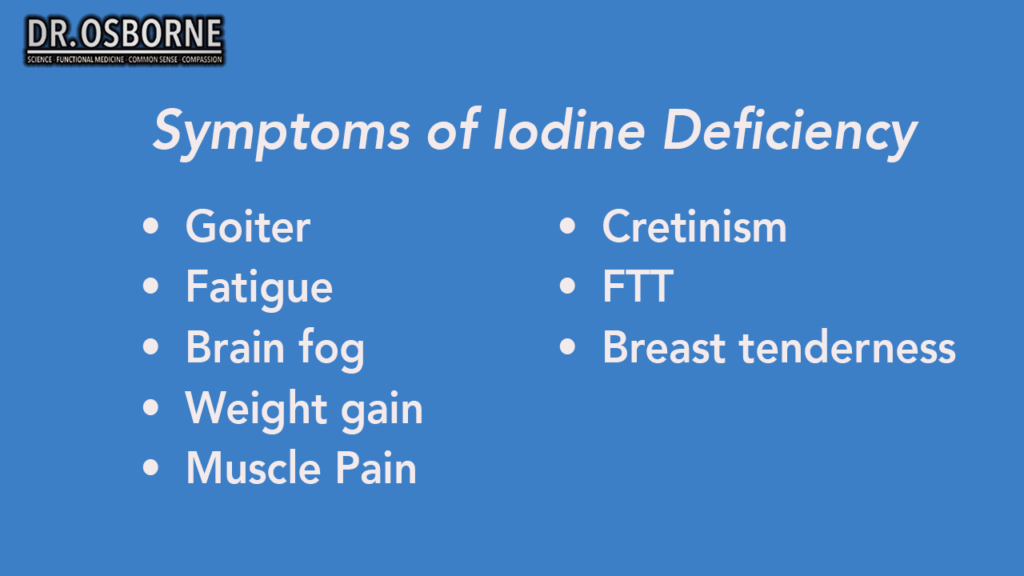 While iodine deficiency is one of the most preventable problems in the world, especially with it being added to salt, when tested, most levels in the salt aren’t sufficient. Therefore, it’s best to not rely on this as a primary source. Becoming deficient in this nutrient can cause many issues, including:
While iodine deficiency is one of the most preventable problems in the world, especially with it being added to salt, when tested, most levels in the salt aren’t sufficient. Therefore, it’s best to not rely on this as a primary source. Becoming deficient in this nutrient can cause many issues, including:
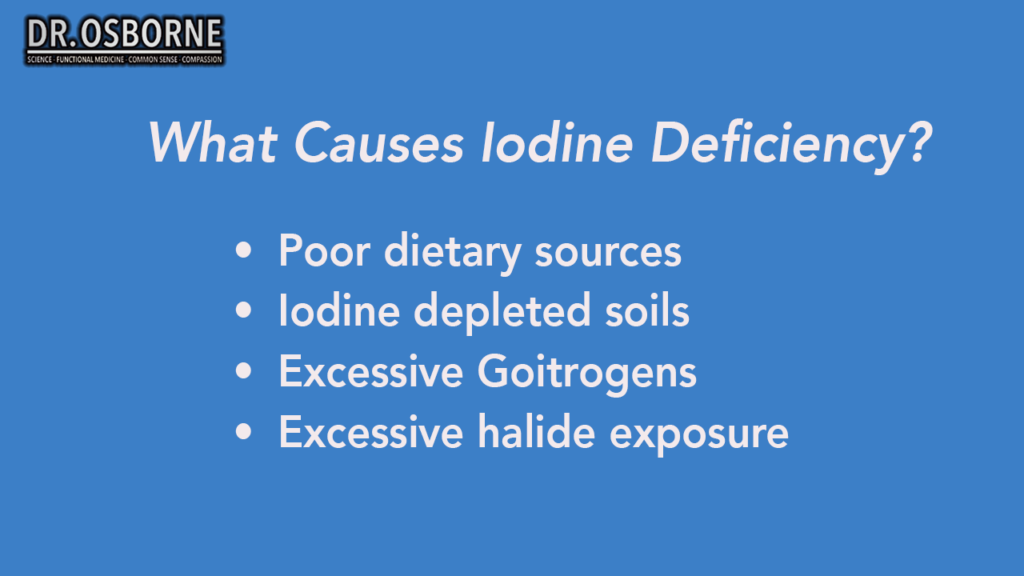 So apart from eating a poor diet where very little to no iodine is present, what can actually cause a deficiency? One cause of deficiency that most people don’t think about is depleted soils.
Crops will often take on some of the nutrients and minerals contained in the soil they are grown in. If the soil is depleted of iodine, food grown in it won’t be as nutrient-dense as it could be.
So apart from eating a poor diet where very little to no iodine is present, what can actually cause a deficiency? One cause of deficiency that most people don’t think about is depleted soils.
Crops will often take on some of the nutrients and minerals contained in the soil they are grown in. If the soil is depleted of iodine, food grown in it won’t be as nutrient-dense as it could be.
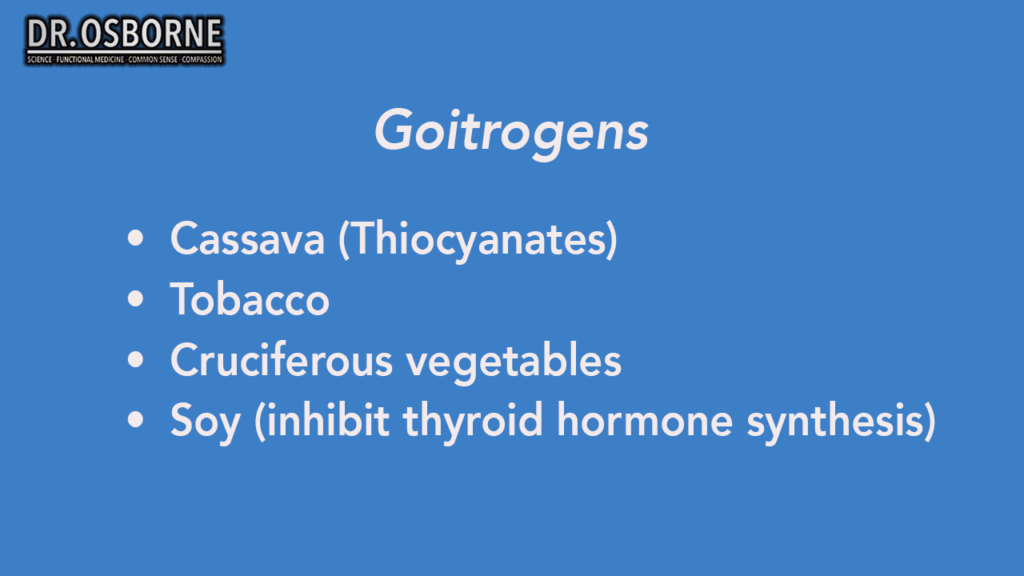 Another major cause of deficiency is excessive goitrogen exposure. These are substances that can actually inhibit thyroid hormone formation, often by preventing the uptake of iodine. These include:
Another major cause of deficiency is excessive goitrogen exposure. These are substances that can actually inhibit thyroid hormone formation, often by preventing the uptake of iodine. These include:
 As mentioned, while iodine can be obtained from iodized salt, it’s not the best source when looking for adequate, consistent amounts. Instead, there are many great sources in food found in most kitchens. These include milk (preferably A2 milk), eggs, potatoes, chicken, and seafood like fish and shrimp.
While maybe not as common, one of the richest known sources is actually seaweed. Additionally, well water, if the well is dug deep enough, can be a great source as well.
As mentioned, while iodine can be obtained from iodized salt, it’s not the best source when looking for adequate, consistent amounts. Instead, there are many great sources in food found in most kitchens. These include milk (preferably A2 milk), eggs, potatoes, chicken, and seafood like fish and shrimp.
While maybe not as common, one of the richest known sources is actually seaweed. Additionally, well water, if the well is dug deep enough, can be a great source as well.
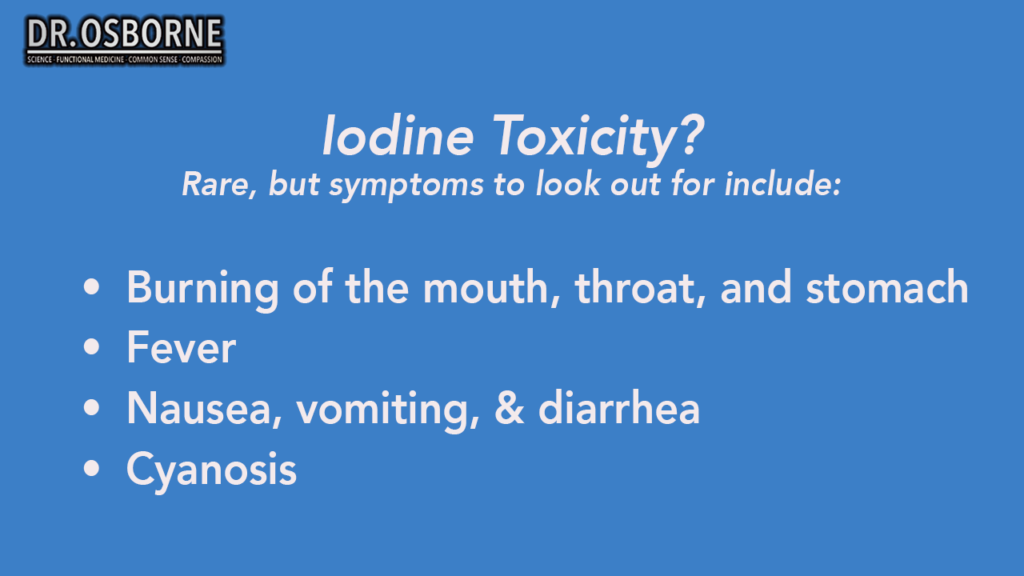 While toxicity is not generally an issue with iodine, it can still occur. To get to this point, an individual would need to be taking several grams daily. The symptoms may simulate hyperthyroidism but quickly dissipate with a cessation in consumption.
If toxic levels are reached, an individual may have burning of the mouth, throat, and stomach, fever, nausea, and vomiting. Cyanosis, or blue discoloration of the skin, could also occur. Additionally, while some individuals may be allergic to the preparation of iodine, it’s actually impossible to be allergic to the nutrient itself.
While toxicity is not generally an issue with iodine, it can still occur. To get to this point, an individual would need to be taking several grams daily. The symptoms may simulate hyperthyroidism but quickly dissipate with a cessation in consumption.
If toxic levels are reached, an individual may have burning of the mouth, throat, and stomach, fever, nausea, and vomiting. Cyanosis, or blue discoloration of the skin, could also occur. Additionally, while some individuals may be allergic to the preparation of iodine, it’s actually impossible to be allergic to the nutrient itself.
 While we’ve all heard of iodine, it’s amazing how little most of us know about it. Yet, without it, there could be severe consequences to the functioning of our body and even death. That is why it’s important to become educated, take ownership of our diets, and improve our own health habits as well as those of our family’s.
While we’ve all heard of iodine, it’s amazing how little most of us know about it. Yet, without it, there could be severe consequences to the functioning of our body and even death. That is why it’s important to become educated, take ownership of our diets, and improve our own health habits as well as those of our family’s.
Stay up-to-date with the latest articles, tips, recipes and more.

*These statements have not been evaluated by the Food and Drug Administration. This product is not intended to diagnose, treat, cure or prevent any disease.
If you are pregnant, nursing, taking medication, or have a medical condition, consult your physician before using this product.
The entire contents of this website are based upon the opinions of Peter Osborne, unless otherwise noted. Individual articles are based upon the opinions of the respective author, who retains copyright as marked. The information on this website is not intended to replace a one-on-one relationship with a qualified health care professional and is not intended as medical advice. It is intended as a sharing of knowledge and information from the research and experience of Peter Osborne and his community. Peter Osborne encourages you to make your own health care decisions based upon your research and in partnership with a qualified health care professional.
© 2025 Gluten Free Society. All rights reserved.